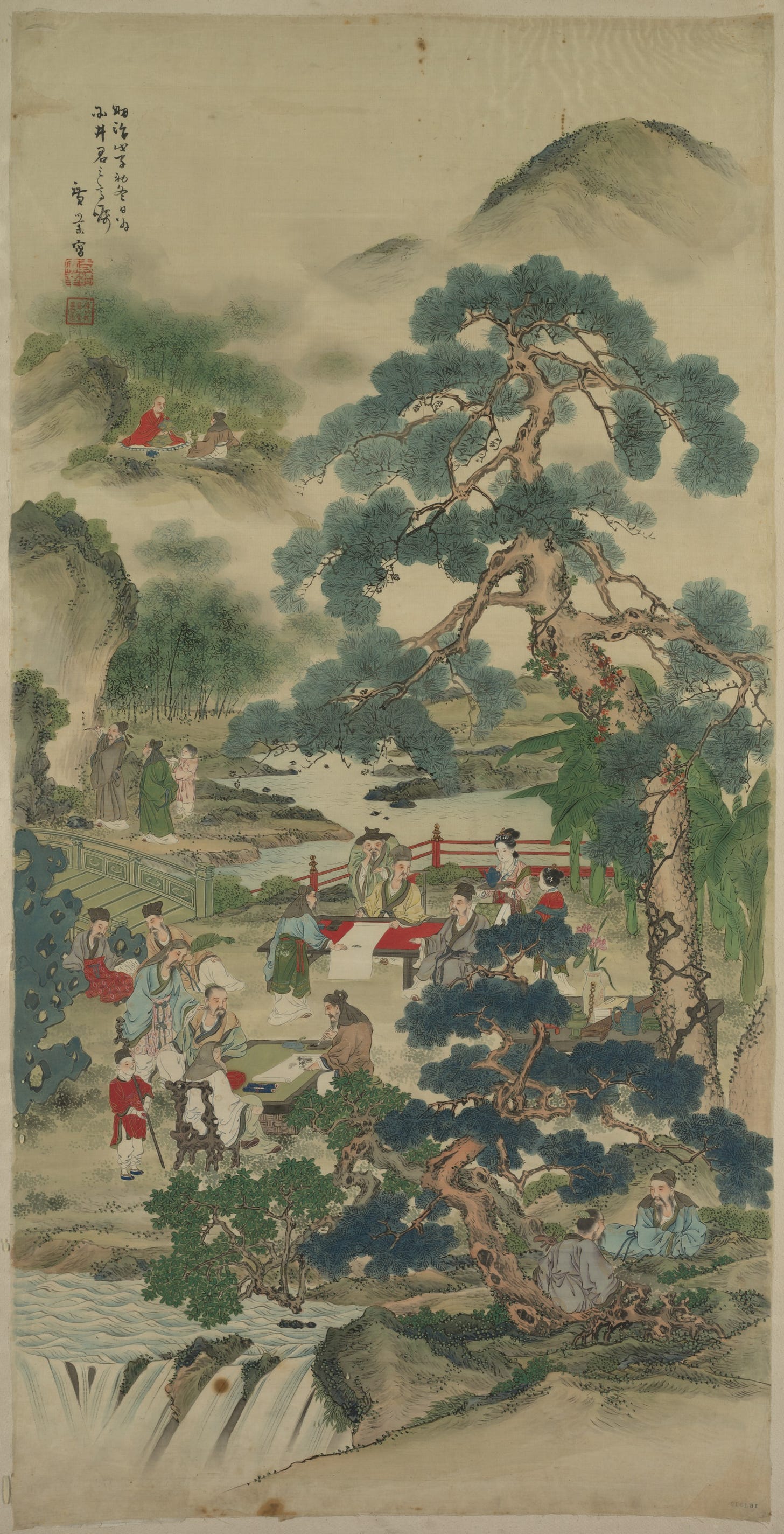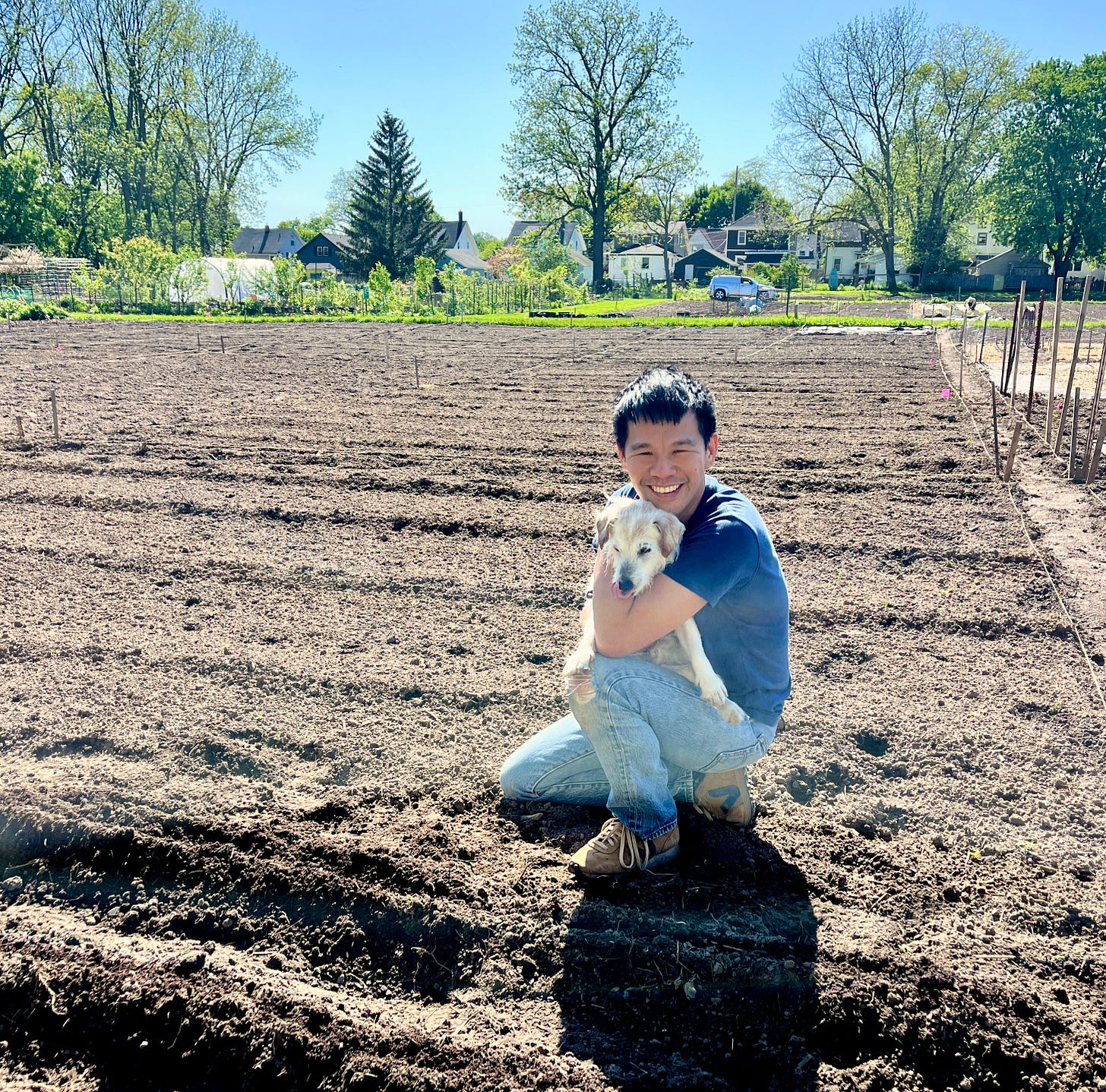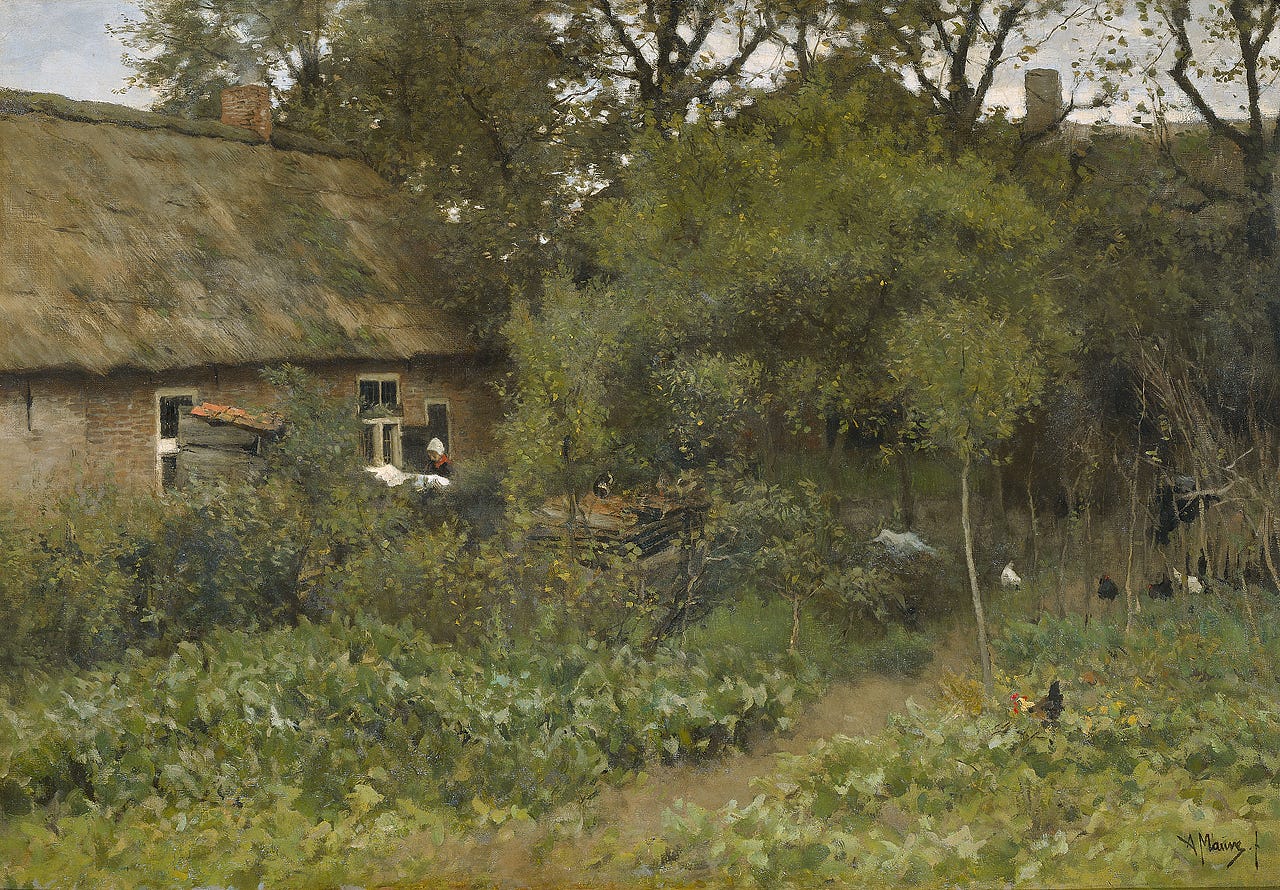What Does Your Garden Grow?
Some fragmented thoughts on the new growing season, our community-garden plot, the prophet Jeremiah's ancient counsel, the Ascension, and art for Gaza
Friday, May 10
Grand Rapids, Mich.
Last time I wrote to you, about my visit to Waco, I made a passing reference to the Prophet Jeremiah’s ancient counsel to the exiles in Babylon: “Plant gardens and eat what they produce.”
Jeremiah’s words came to mind again earlier this week as Fozzie and I began planting our seasonal community-garden plot. I thought about how the old prophet’s counsel wasn’t just about making sure that the gardeners themselves were well-fed. After all, what good is nourishment that is hoarded, not shared?

“Seek the welfare of the city where I have sent you,” he said, channeling the voice of God. “Pray to the Lord on its behalf, for in its welfare, you will find your welfare.”
In its welfare, you will find your welfare.
We started a row of bok choy, one of spinach, and two of lettuce, and we began putting our seed potatoes into the ground, hilling the soil to give them room to grow. I’m super-curious to see whether the gladioli come back; they were planted by the woman who had the plot before I did, and every stem that blossomed last season radiated grace.

This is our fourth season in the community garden. Every year, I learn a little bit more. This year, I’m determined to do a better job of mulching. I will cull some of the volunteer tomatillos that always spring up; last year, my laziness meant that we ended up with way too many, and as much as I like homemade salsa verde, some of that garden space can be better utilized for other crops. I’m quietly gearing up, too, for more vigilant battles against the bindweed and the bean beetle.
As much as I try to leave things better than I found them, tending these soils gives me much more than I will ever be able to offer the soils. Scientists have been studying the effects of working with the soil, which aren’t purely mental but also physiological. Part of that is simply about moving the body—shoveling, squatting, digging, pulling. In recent years, though, they have also learned, for instance, about soil-borne bacteria that, when injected into mice, boost serotonin levels and reduce inflammation.
In the garden’s welfare, you will find your welfare.
The community garden regularly pulls me out of isolation, urging me to remember our friends and neighbors. Shy introvert that I am, I could pretty happily leave my house almost never. But last summer, we had so many tomatoes that it seemed foolish not to share some with Amy, who lives a couple houses down, and Stephanie, who takes care of Fozzie when we’re away, and Jodi, one of the few friends we had here when we moved to Michigan.
There’s almost always someone else working in the garden. Shortly after Fozzie and I arrived, Roger pulled up in his burgundy minivan. “The old guy is still going!” he said with a smile as soon as he saw the Fozz.
Roger has gardened a plot just north of ours for the past couple of seasons. He has all the discipline that I lack. Every year, he builds a lovely fence, establishes orderly rows, and erects tidy trellising. He weeds meticulously and mulches religiously. I admire his level of attentiveness, and I aspire to his remarkable care.
A grandfather who is in his 70s, Roger commiserates with Fozz—and increasingly with me—about the aches of an aging body. Still, most mornings, that body shows up in the garden, tending to other living things and doing it so very well.
Last season, he had too many squash seedlings, so he gave me three for my plot. I’ve tried to start squash before, and every time, I’ve failed. My neglect quickly killed two of Roger’s plants, but the one that survived gave us the only yellow squash I’ve ever successfully harvested.

In the community’s welfare, you will find your welfare.
We’re growing some things in our backyard this season. Our irises, which are blooming spectacularly right now, also remind me of relationship. Some grew from roots my mother sent from her own garden; others, I transplanted from next door, after our neighbor Sally moved away.
But the community garden is so special in part because I know it’s not mine. While I might tend my plot for a season or two or three, there are no illusions about ultimate ownership. This soil is ours to steward and to share, not to possess or to keep.
A garden rebukes any notion of independence. It is impossible to grow anything on one’s own. Every single seedling, each blossom, each bud, testifies to collaboration and partnership: sun and rain, bees and microbes.
In the community garden, I can’t help but be reminded of the wider world, seen and unseen.
I was looking over the map of plots the other day. Because this is Grand Rapids, there is no shortage of Dutch names: “Van” this and “Vander” that and a whole bunch that end in “-stra.” But I also saw Polish and German and Scandinavian surnames, East Asian and South Asian ones, Latino and Arab. Last season, I met a Ugandan-born woman who, in her plot, grows greens that taste like home, which she can’t find in any grocery store. Here we all are, a salad bowl of stories that trace back across oceans, together tending the same soils where the People of the Three Fires grew beans, squash, and corn centuries before us.
My family’s story isn’t just a story of those who came to the U.S.; it’s also the story of those who stayed, those who reckon daily with an increasingly tyrannical Chinese government, those still living in a Hong Kong where freedom is ever more restricted, activists jailed and dissenting voices silenced.
I wonder about these other families. What are their stories? Which loved ones did they leave behind? What is happening in the other lands they love? What are the joys, and what are the struggles? What tastes like home to them?
I wonder, too, what it means to be good neighbors to all of them and how to love one another, whether near or far, known to us and unknown.
In the world’s welfare, you will find your welfare.
Jeremiah’s mention of gardens is one of many in Scripture. In fact, there is a garden in the very first chapter of the Bible, and there is also a garden in the very last. And the wild vision in the Book of Revelation actually describes an urban garden, growing on either side of the river of the water of life that flows through the heavenly city. “On either side of the river is the tree of life, with its twelve kinds of fruit, producing its fruit each month; and the leaves of the tree are for the healing of the nations. Nothing accursed will be found there any more.”

Could it be true? No bean beetles to destroy the crop? A gardener can dream.
The garden can be so many things: A symbol of original goodness and a sign of ultimate restoration. A vessel of memory and a link to heritage. Amid the violence and chaos of the world, a place for respite, a space for nourishment, and a portal to empathy.
So many good things can grow in a garden: Flowers. Vegetables. Knowledge. Understanding. Perhaps, also, hope.
What I’m Listening to: Yesterday was Ascension Day, which commemorates the end of Jesus’s earthly ministry and his ascent to heaven. When I was a kid, I don’t think I heard about this holy day once. But Jesus’s ascension matters deeply to those of us who identify as Christian. It commemorates the end of Jesus’s earthly ministry and his ascent to heaven, where, according to both the Apostles and Nicene Creeds, he is seated at the right hand of God the Father.
Yesterday, I put on the French composer Olivier Messiaen’s L’Ascension. Written in the early 1930s, this symphonic, four-part meditation on the Ascension is moody and mysterious, contemplative and stirring. Messiaen was open about his deep Catholic faith, which he considered essential to his composition but also not a barrier to his music for those who did not share his beliefs. “I have,” he said, “tried to bring forth a type of music which touches everything without ceasing to touch God.” I especially love the last and longest movement of L’Ascension, Prière du Christ montant vers son Père (Prayer of the Christ ascending toward his Father).
Tell me: What are you growing in your garden this season? And how does your garden grow you?
Over on Instagram, my friend Chris Yi Suh has organized a three-day art auction to help raise money to evacuate the Mortaja family from Gaza.
Chris’s friend Hani Mortaja is a Palestinian photographer who lives in Belgium. Dozens of his relatives have been killed during the war. He is now raising funds to help gain safe passage to Egypt for his parents, his six siblings, and their families, including a baby named Mohammad, who was born amidst the war.
The auction features some of Mortaja’s stirring photography as well as work by 12 other artists. Bidding is open now and ends on Sunday, May 12th, at 9 p.m. ET.
That’s it for this week. As always, feedback is welcome. Email me at makebelievefarmer@gmail.com.
In hope and with gratitude,
Jeff




I love the idea of a community garden. Curious as to how it actually works. Do you work and harvest only your space? Can anyone come and harvest from your crop and you theirs? Or does everyone simple grow one crop and then share with all the others? How do you manage a potential neighboring gardener that lets their area get out of hand?
After neglecting my garden last year, I worked to get some kale going this spring, which is now producing enough to share. Yesterday I planted a tomato, a bunch of basil, and five hot peppers (my spouse likes to make homemade fermented hot sauce). And my strawberries are ripening! It feels good to be eating from the garden again.